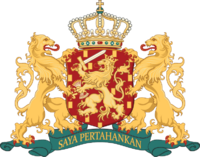Council of State (Hindia Belanda)
 |
|---|
| This article is part of a series on the politics and government of Hindia Belanda |
The Council of State of Hindia Belanda (Indonesian: Dewan Negara; Dutch: Raad van State) is the formal body of advisers to the Governor-General of Hindia Belanda. Comprised of two councils, being the executive and advisory councils, the Council of State is the mechanism through which all executive functions are executed in the name of the Governor-General. In addition, the Council of State is often the venue for discussion of sensitive matters between the government and the opposition.
The executive body is comprised of the Prime Minister and the cabinet; indeed, the Hindia Belandan cabinet only exists by virtue of belonging to this body. All ministers who make up the cabinet, as well as other functionaries who attend cabinet, are thus sworn into the executive body at the start of their tenures. The advisory body is comprised of the Leader of the Opposition, select Shadow Ministers and other functionaries. Together, the two bodies sit with the Governor-General to effect all executive powers, though in practice all decisions are made by the government of the day. All members of the Council of State are known as Councillors of State or State Councillors.
The Council of State in its entirety meets at Setyamo House on Friday morning every two weeks, but the executive body, being comprised of the cabinet, meets at Istana Nusantara at least once a week. On occasions, the cabinet may meet in other locations, within Hindia Belanda or elsewhere. Notably, during the biannual Royal Union Conference of Ministers in Koninstad, the executive body meets at Hindia Belanda Huis. During much of the 2020 Asterovirus pandemic, the Council of State met remotely via teleconference.
History
The Council of State evolved from its preceding body, the Raad van Indië. It came into existence on 12 August 1929, when Hindia Belanda became independent from Noordenstaat. Members of the previous Raad van Indië became members of the new Council of State's advisory body.
Composition
The Council of State is composed of two bodies: the executive and the advisory bodies.
The executive body comprises the Prime Minister and all Ministers of the Crown. In addition, it also includes other persons who also attend cabinet. These are the Government Leader in the Dewan Deputi, the Government Leader in the Dewan Bangsawan, the President of the Council of State, the Government Whip in the Dewan Deputi and the Captain of Lorecian Persons.
The advisory body comprises
- the Leader of the Opposition;
- the Shadow Foreign Minister;
- the Shadow Defence Secretary;
- the Shadow Finance Minister;
- the Shadow Minister for Interior and Kingdom Affairs;
- the Shadow Minister for Economic Affairs;
- the Shadow Minister for Justice and Security;
- the Shadow Minister for Social Welfare, Public Health and Sports;
- the Shadow Minister for Education, Culture and Science;
- the Shadow State Secretary for Combatting Extremism;
- and the Vice-President of the Council of State.
Powers and functions
The Council of State, with the Governor-General present, is empowered by the Charter for the Commonwealth of Hindia Belanda to do, but not limited to, the following:
- issue a Governor-in-Council to carry out most viceregal prerogatives or issue a secondary legislation (usually reglement or to make a government appointment) by virtue of an Act of the Staten-Generaal;
- appoint wedanas;
- declare public holidays;
- declare war;
- exile a criminal (provided for, but no longer enforced);
- regulate the commonwealth flag protocols;
- and, since 2019, alter the law of succession to the Hindia Belandan monarchy following a referendum.
The above decisions are taken in the name of the Governor-General with the advice of the executive council of the Council of State; they are, effectively, decisions made by the government.
Committees
Committees, both permanent and select, form part of the Council of State. The primary function of these committees is to provide a forum for the government and the opposition to discuss and reach a consensus on sensitive issues, before bills of law or other legal instruments concerning the issues are introduced by the government. The Council of State has several permanent committees whose members are drawn from both the executive and advisory councils. These are:
- Committee for the Autonomous Territory of Southeastern Malaya
- Committee for Relations with the Sub-National Monarchies
- Committee for the Security of the Commonwealth
- Committee for State Appointments
- Wartime Committee
The Wartime Committee has never sat since Hindia Belandan independence, although its existence is provided for by the Charter for the Commonwealth of Hindia Belanda. During the colonial period, the Wartime Committee was part of the Raad van Indië and served an important role during the Great Astyrian War.
In addition to permanent committees, the Council of State is empowered to form select committees from time to time as may be necessary. As of 2022, there are two select committees: the Select State Committee for Counterterrorism and the Select State Committee for Common Pool Resources Governance.
Membership
As of 2022, membership of the Council of State is as follows: